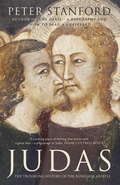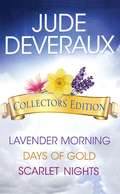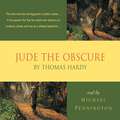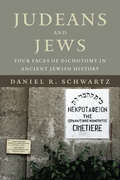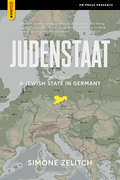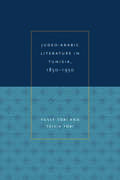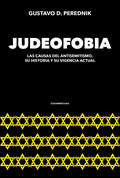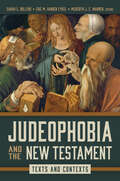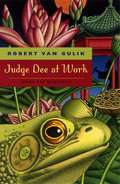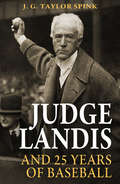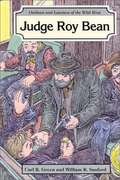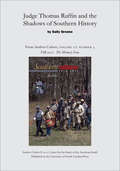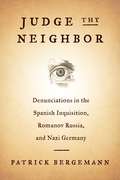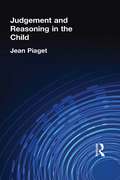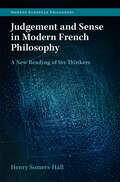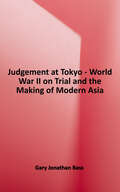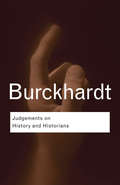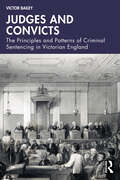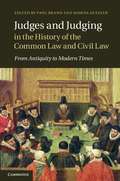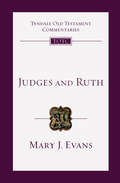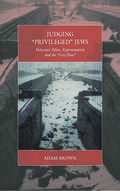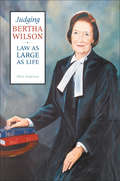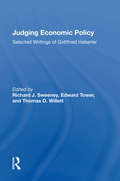- Table View
- List View
Judas: The troubling history of the renegade apostle
by Peter StanfordIn this fascinating historical and cultural biography, writer and broadcaster Peter Stanford deconstructs that most vilified of Bible characters: Judas Iscariot, who famously betrayed Jesus with a kiss. Beginning with the gospel accounts, Peter explores two thousand years of cultural and theological history to investigate how the very name Judas came to be synonymous with betrayal and, ultimately, human evil. But as Peter points out, there has long been a counter-current of thought that suggests that Judas might in fact have been victim of a terrible injustice: central to Jesus' mission was his death and resurrection, and for there to have been a death, there had to be a betrayal. This thankless role fell to Judas; should we in fact be grateful to him for his role in the divine drama of salvation? 'You'll have to decide,' as Bob Dylan sang in the sixties, 'Whether Judas Iscariot had God on his side'.An essential but doomed character in the Passion narrative, and thus the entire story of Christianity, Judas and the betrayal he symbolises continue to play out in much larger cultural histories, speaking as he does to our deepest fears about friendship, betrayal and the problem of evil. Judas: the ultimate traitor, or the ultimate scapegoat? This is a compelling portrait of Christianity's most troubling and mysterious character.
Judas: The troubling history of the renegade apostle
by Peter StanfordIn this fascinating historical and cultural biography, writer and broadcaster Peter Stanford deconstructs that most vilified of Bible characters: Judas Iscariot, who famously betrayed Jesus with a kiss. Beginning with the gospel accounts, Peter explores two thousand years of cultural and theological history to investigate how the very name Judas came to be synonymous with betrayal and, ultimately, human evil. But as Peter points out, there has long been a counter-current of thought that suggests that Judas might in fact have been victim of a terrible injustice: central to Jesus' mission was his death and resurrection, and for there to have been a death, there had to be a betrayal. This thankless role fell to Judas; should we in fact be grateful to him for his role in the divine drama of salvation? 'You'll have to decide,' as Bob Dylan sang in the sixties, 'Whether Judas Iscariot had God on his side'.An essential but doomed character in the Passion narrative, and thus the entire story of Christianity, Judas and the betrayal he symbolises continue to play out in much larger cultural histories, speaking as he does to our deepest fears about friendship, betrayal and the problem of evil. Judas: the ultimate traitor, or the ultimate scapegoat? This is a compelling portrait of Christianity's most troubling and mysterious character.
Jude Deveraux Collectors' Edition Box Set
by Jude DeverauxRediscover all of the magic and romance of Edilean in this special collector's edition box set of Jude Deveraux's New York Times bestsellers: Lavender Morning, Days of Gold, and Scarlet Nights. Plus, get a special early look at Heartwishes, the latest in Jude Deveraux's Edilean series!Lavender MorningJocelyn Minton is a woman torn between two worlds. Her mother grew up attending private schools and afternoon teas, but she married the local handyman. After her mother died when Joce was only five years old, her father remarried into his own class, and Joce became an outsider -- until she met Edilean Harcourt. Although she was sixty years Joce's senior, Miss Edi was a kindred soul who understood her like no one else ever had. When Miss Edi passes away, she leaves Joce all her worldly possessions, including an eighteenth-century house and a letter with clues to a mystery that began in 1941. In the letter, Miss Edi also mentions that she has found the perfect man for Joce -- a handsome young lawyer. Joce is shocked to learn that the mystery, the house, and the future love of her life are all in Edilean, a small town in Virginia that Miss Edi never told her about. Hurt that the woman who meant so much to her kept so many secrets, Jocelyn moves to this tight-knit village in an attempt to understand the legacy that has been left to her. As she begins to dig into Miss Edi's mystery, she soon discovers some shocking surprises about her family's history and her own future -- and she meets a man with his own mysterious past. Days of GoldIn 1766 Scotland, the laird of the clan, Angus McTern, has everything he wants in life. Although his grandfather lost the family's land and castle in a card game when Angus was just a boy, Angus takes his duties seriously and is respected by all the men and adored by the women. That is, until Edilean Talbot shows up. Breathtakingly beautiful and born of privilege, Edilean represents everything Angus despises. Still he is as dazzled by her as everyone else is, and he can keep his feelings hidden from her for only so long. When she rejects him he is deeply wounded and, worse, humiliated before his clan. But then the day comes when Edilean needs Angus's help, to reclaim the gold she inherited from her father, which is on its way to America. At first Angus refuses, but her beauty -- and her tears -- so haunt him that he puts aside his pride and decides to aid the heiress. However, when Angus tries to intervene, he's accused of kidnapping and theft. To avoid being prosecuted, he's forced to leave behind all that he knows and loves and escape with Edilean to America. There they will overcome almost insurmountable obstacles as they are pursued endlessly by the man who claims the gold for his own. Despite all that tries to keep them apart, Angus and Edilean also find a love as wild and free as the land itself. Scarlet NightsSara Shaw and Greg Anders are engaged to be married. Unfortunately, unknown to Sara, Greg is a big time fraud man, descended from a long line of con artists and thieves. In fact, his mother is also in Edilean, incognito, and master minding a scheme to pull off the heist of a lifetime -- and Greg is using Sara to get closer to what his mother is seeking.But when Mike Newland, an undercover cop who is investigating Greg and his family, enters the picture, he is able to tip Sara off that her fiancÉe is not who he seems - and he asks her help in catching the criminals the Feds have been trying to capture for over 20 years. Instead of planning her wedding, Sara becomes involved in Mike's plan to get evidence against Greg and his mother, and that involves using Sara as bait. Terrified, Sara must pretend that she still loves Greg even after she finds out the truth about him. And along the way, Sara gets to know Mike and finds out about his long connection to the town of Edilean. Together, with the help of Jocelyn from Lavender Morning, they at last learn the secret that has been haunting the town of Edilean for almost 70 years. As in Lavender Morning, the story is told with historical flashba...
Jude the Obscure
by Thomas HardyHardy called this story 'a deadly war waged between flesh and spirit'. It is a tale of doomed love and unfulfilled promise that revolves around Jude Fawley, an ambitious and intelligent young man, his cousin Sue Bridehead and his academic mentor Phillotson.(P)1996 Hodder & Stoughton Audiobooks
Judeans and Jews
by Daniel R. SchwartzIn writing in English about the classical era, is it more appropriate to refer to "Jews" or to "Judeans"? What difference does it make? Today, many scholars consider "Judeans" the more authentic term, and "Jews" and "Judaism" merely anachronisms.In Judeans and Jews, Daniel R. Schwartz argues that we need both terms in order to reflect the dichotomy between the tendencies of those, whether in Judea or in the Disapora, whose identity was based on the state and the land (Judeans), and those whose identity was based on a religion and culture (Jews).Presenting the Second Temple era as an age of transition between a territorial past and an exilic and religious future, Judeans and Jews not only sharpens our understanding of this important era but also sheds important light on the revolution in Jewish identity caused by the creation of the modern state of Israel.
Judenstaat: The Novel Of A Jewish State In Germany (Spectacular Fiction)
by Simone ZelitchIt is 1988. Judit Klemmer is a filmmaker who is assembling a fortieth-anniversary official documentary about the birth of Judenstaat, the Jewish homeland surrendered by defeated Germany in 1948. Her work is complicated by Cold War tensions between the competing U.S. and Soviet empires and by internal conflicts among the "black-hat" Orthodox Jews, the far more worldly Bundists, and reactionary Saxon nationalists, who are still bent on destroying the new Jewish state. But Judit's work has far more personal complications. A widow, she has yet to deal with her own heart's terrible loss—the very public assassination of her husband, Hans Klemmer, shot dead while conducting a concert. Then a shadowy figure slips her a note, with new and potentially dangerous information about her famous husband's murder. Then the ghost steps in...
Judeo-Arabic Literature in Tunisia, 1850-1950
by Tsivia Tobi Yosef TobiAs a result of the introduction of the printing press in the mid-nineteenth century and the proximity of European culture, language, and literature after the French occupation in 1881, Judeo-Arabic literature flourished in Tunisia until the middle of the twentieth century. As the most spoken language in the country, vernacular Judeo-Arabic allowed ideas from the Jewish Enlightenment in Europe (the Haskalah) to spread widely and also offered legitimacy to the surrounding Arab culture. In this volume, authors Yosef and Tsivia Tobi present works of Judeo-Arabic Tunisian literature that have been previously unstudied and unavailable in translation. In nine chapters, the authors present a number of works that were both originals and translations, divided by genre. Beginning each with a brief introduction to the material, they present translations of piyyutim (liturgical poems), malzumat (satirical ballads), qinot (laments), ghnayat (songs), essays on ideology and propaganda, drama and the theater, hikayat and deeds of righteous men (fiction), and Daniel Hagège's Circulation of Tunisian Judeo-Arabic Books, an important early critical work. A comprehensive introduction details the flowering of Judeo-Arabic literature in North Africa and appendixes of Judeo-Arabic journals, other periodicals, and books complete this volume. Ultimately, the authors reveal the effect of Judeo-Arabic literature on the spiritual formation of not only the literate male population of Tunisian Jews, who spent a good part of their time at the synagogue, but also on women, the lower and middle classes, and conservatives who leaned toward modernization. Originally published in Hebrew, Judeo-Arabic Literature in Tunisia, 1850-1950 will be welcomed by English-speaking scholars interested in the literature and culture of this period.
Judeofobia: Las causas del antisemitismo, su historia y su vigencia actual
by Gustavo Perednik¿Cuáles son los orígenes del odio antijudío? ¿Cuáles fueron sus motivaciones históricas y cuáles sus mitos fundantes? ¿Cuáles las causas de su persistencia? El odio a los judíos, la judeofobia, es uno de los más antiguos y persistentes de la historia. Desde los escritos de Alejandría y la expulsión de España hasta el cantonismo ruso y el Holocausto, es un fenómeno que ha atravesado todas las épocas y se manifiesta de formas diferentes, ora sutiles, ora brutales, todavía en nuestros días. Tanto los medios y la esfera pública como los ámbitos más privados y cotidianos son arena en la que a cada momento se despliega una miríada de prejuicios. ¿Cuáles son las peculiaridades de la judeofobia que hacen que emerja una y otra vez, incluso en los rincones menos esperados? En este libro indispensable, Gustavo Perednik responde esta y otras preguntas al tiempo que explora a fondo los orígenes, las motivaciones y los mitos fundantes de la hostilidad antijudía. Porque contra todo pronóstico optimista, nuestro siglo XXI sigue demandando una mirada alerta que oponga racionalidad reflexiva a la sinrazón demonizadora.
Judeophobia and the New Testament: Texts and Contexts
by Eric M. Vanden Eykel and Meredith J. C. WarrenAn essential resource for understanding the troubling role of the Christian scriptures in anti-Semitism This eye-opening collection of essays is essential reading for anyone concerned about the ways that Christian scripture has been used—both in the past and the present—in service of anti-Semitism. The authors seek to identify, contextualize, and problematize New Testament &“Judeophobia,&” a broad heading that encompasses anti-Semitism, supersessionism, and various discriminatory practices against Jews at different points in history. In the first half of Judeophobia and the New Testament: Texts and Contexts, readers engage with the subject matter through thematic essays. In the second half, readers engage with text-based essays that focus on individual books of the New Testament as well as relevant non-canonical literature. Throughout, the book&’s goal is to educate readers about the ways that New Testament texts have been used to engender Judeophobia from the early church to today. While the book is designed primarily as a resource for teachers and students, it also aims to help New Testament scholars account for Judeophobic interpretations, take responsibility for them, and encourage the discipline to work against its own role in rising anti-Jewish rhetoric and violence.Contributors Matthew R. Anderson Jeremiah Bailey Mary Ann Beavis Chance E. Bonar Tom de Bruin Christy Cobb Cavan Concannon David L. Eastman Scott S. Elliott Sarah Emanuel Emily Gathergood Mark Godin Jill Hicks-Keeton Meira Z. Kensky Kyu Seop Kim Brian Yong Lee Harry O. Maier Shelly Matthews James F. McGrath Hugo Méndez Mark D. Nanos Sara Parks Shaily Shashikant Patel Adele Reinhartz Michael Scott Robertson Sarah E. Rollens Justin Jeffcoat Schedtler Nathan Shedd Shayna Sheinfeld Ekaputra Tupamahu Eric Vanden Eykel Alana M. Vincent Meredith J. C. Warren Taylor M. Weaver
Judge Dee at Work: Eight Chinese Detective Stories
by Robert H. Van GulikThese eight stories, featuring the master-detective of Ancient China and his assistants Ma Joong, Sergeant Hoong, and Chiao Tai, cover a decade during which the judge served in four different provinces of the T'ang Empire. From the suspected treason of a general in the Chinese army facing the Tartar hordes on the western frontier to the murder of a lonely poet in his garden pavilion in Han-yuan, the cases presented here are among the most memorable of Judge Dee's long and distinguished career.
Judge Landis and 25 Years of Baseball
by J. G. Taylor SpinkJudge Landis and 25 Years of Baseball, first published in 1947, is a look at the career of Judge Kenesaw Mountain Landis, a federal judge and professional baseball’s first commissioner, who served in that position for 25 years until his death in 1944. The book, authored by J. G. Taylor Spink, editor of the influential The Sporting News, also serves as a history of major league baseball at that time - the team owners, the players, the legal battles, and the scandals (including the infamous “Black Sox” scandal). Judge Landis’s decisive actions and iron rule over the game were largely responsible for restoring public confidence in the sport. Included are 5 pages of photographs.
Judge Roy Bean (Outlaws and Lawmen of the Wild West)
by Carl R. Green William R. Sanford- Biographies of famous and infamous men of the Western frontier. - Entices the reluctant reader to relive the exciting days of the Wild West.
Judge Thomas Ruffin and the Shadows of Southern History
by Sally GreeneJudge Thomas Ruffin and the Shadows of Southern Historyby Sally GreeneNorth Carolina's State Capitol still houses a statue to one of southern history's most notorious pro-slave-owner judges. Why?"Ruffin was ideologically sympathetic to the Confederate cause and remained so to his death. 'The power of the master must be absolute,' Ruffin wrote in State v. Mann (1829), 'to render the submission of the slave perfect.' State v. Mann became the most notorious opinion in the entire body of slavery law."
Judge Thy Neighbor: Denunciations in the Spanish Inquisition, Romanov Russia, and Nazi Germany (The Middle Range Series)
by Patrick BergemannFrom the Spanish Inquisition to Nazi Germany to the United States today, ordinary people have often chosen to turn in their neighbors to the authorities. What motivates citizens to inform on the people next door? In Judge Thy Neighbor, Patrick Bergemann provides a theoretical framework for understanding the motives for denunciations in terms of institutional structures and incentives.In case studies of societies in which denunciations were widespread, Bergemann merges historical and quantitative analysis to explore individual reasons for participation. He sheds light on Jewish converts’ shifting motives during the Spanish Inquisition; when and why seventeenth-century Romanov subjects fulfilled their obligation to report insults to the tsar’s honor; and the widespread petty and false complaints filed by German citizens under the Third Reich, as well as present-day plea bargains, whistleblowing, and crime reporting. Bergemann finds that when authorities use coercion or positive incentives to elicit information, individuals denounce out of self-preservation or to gain rewards. However, in the absence of these incentives, denunciations are often motivated by personal resentments and grudges. In both cases, denunciations facilitate social control not because of citizen loyalty or moral outrage but through the local interests of ordinary participants. Offering an empirically and theoretically rich account of the dynamics of denunciation as well as vivid descriptions of the denounced, Judge Thy Neighbor is a timely and compelling analysis of the reasons people turn in their acquaintances, with relevance beyond conventionally repressive regimes.
Judgement and Reasoning in the Child
by Jean PiagetOver a period of six decades, Jean Piaget conducted a program of naturalistic research that has profoundly affected our understanding of child development.
Judgement and Sense in Modern French Philosophy: A New Reading of Six Thinkers (Modern European Philosophy)
by Henry Somers-HallThis book proposes a radical new reading of the development of twentieth-century French philosophy. Henry Somers-Hall argues that the central unifying aspect of works by philosophers including Sartre, Foucault, Merleau-Ponty, Deleuze and Derrida is their attempt to provide an account of cognition that does not reduce thinking to judgement. Somers-Hall shows that each of these philosophers is in dialogue with the others in a shared project (however differently executed) to overcome their inheritances from the Kantian and post-Kantian traditions. His analysis points up the continuing relevance of German idealism, and Kant in particular, to modern French philosophy, with novel readings of many aspects of the philosophies under consideration that show their deep debts to Kantian thought. The result is an important account of the emergence, and essential coherence, of the modern French philosophical tradition.
Judgement at Tokyo: World War II on Trial and the Making of Modern Asia
by Gary Jonathan BassFrom the author of the acclaimed The Blood Telegram and finalist for the Pulitzer Prize for General Non-Fiction, comes a landmark, magisterial history of the trial of Japan’s leaders as war criminals—the largely overlooked Asian counterpart to Nuremberg. In the weeks after Japan finally surrendered to the Allies to end World War II, the victorious powers turned to the question of how to move on from years of carnage and destruction. For American leaders President Harry Truman and General Douglas MacArthur, Britain’s Winston Churchill, China’s Chiang Kai-shek, and their fellow victors, the question of justice seemed clear: Japan’s militaristic leaders needed to be tried and punished for their crimes. For the Allied powers, the trials were an opportunity both to render judgment on their vanquished foes and to create a legal framework to prosecute war crimes and prohibit the use of aggressive war. For the Japanese leaders on trial, it was their chance to argue that their war had been waged to liberate Asia from Western imperialism and that the court was no more than victors’ justice. For more than two years, the tensions and contradictions of the courtroom could be seen playing out across Asia as the trial unfolded in the crucial early years of the Cold War and the end of the European empires. They have influenced power politics across Asia and the Pacific ever since. Gary J. Bass' Judgement at Tokyo is the product of a decade of research, a magnificent, riveting story of wartime action, dramatic courtroom battles, and the epic formative years that set the stage for the postwar era in the Asia–Pacific.
Judgements on History and Historians (Routledge Classics Ser.)
by Jacob BurckhardtWestern Civilisation was in its pomp when Jacob Burckhardt delivered his Judgements on History and Historians; European Empires spanned the globe, while the modern age was being forged in the nationalist revolutions of 1848. As a tutor to the young Friedrich Nietzsche as well as one of the first historians to take 'culture' as his subject rather than the triumphs and travails of kings and generals, Burckhardt was at the vanguard of this modern sensibility. Ambitious in its scope, ranging from the days of Ancient Egypt, through the Reformation to the time of Napoleon, this is indeed a history of 'Western Civilization', written before two monstrous world wars threw such a concept into disrepute.
Judges and Convicts: The Principles and Patterns of Criminal Sentencing in Victorian England
by Victor BaileyUncovering the origins of the new sentencing structure that emerged in the course of the nineteenth century, this book travels from the demise of the "Bloody Code" in the 1830s, through the mid-century transition from convict transportation to home-based penal servitude, and on to the remarkable and unprecedented mitigation of sentencing severity in the final two decades of the century.By providing such an extended span of analysis, this book reveals the discrete stages of development in sentencing policy and practice, and particularly the contribution of the small coterie of professional judges at the county Assizes, the Old Bailey (or Central Criminal Court), and the Middlesex Sessions, around whose sentencing decisions the study revolves. In consequence, readers are offered an overarching survey of the nineteenth-century trends in sentencing, including an account of the struggle between politicians, mandarins, and judges for supremacy in sentencing, along with a detailed explanation of that remarkable mitigation of sentencing severity that ultimately defined a new equation between crime and punishment, or the modern sentencing tariff.Judges and Convicts: The Principles and Patterns of Criminal Sentencing in Victorian England will be of great appeal to students and scholars of history, law, criminology, and sociology, particularly to those with an interest in the history of the criminal trial, the judiciary, punishment, and sentencing.
Judges and Judging in the History of the Common Law and Civil Law
by Paul Brand Joshua GetzlerIn this collection of essays, leading legal historians address significant topics in the history of judges and judging, with comparisons not only between British, American and Commonwealth experience, but also with the judiciary in civil law countries. It is not the law itself, but the process of law-making in courts, that is the focus of inquiry. Contributors describe and analyse aspects of judicial activity, in the widest possible legal and social contexts, across two millennia. The essays cover English common law, continental customary law and ius commune, and aspects of the common law system in the British Empire. The volume is innovative in its approach to legal history. None of the essays offer straight doctrinal exegesis; none take refuge in old-fashioned judicial biography. The volume is a selection of the best papers from the 18th British Legal History Conference.
Judges and Ruth: An Introduction and Commentary (Tyndale Old Testament Commentaries #Volume 7)
by Mary J. EvansThe book of Judges presents Israel’s frailty, the nation’s need for deliverance, and God’s use of flawed leaders to guide his chosen people through a dark period of their history. The book of Ruth tells a smaller story within this narrative, showing God quietly at work in the lives of a few individuals. Mary Evans’s replacement Tyndale commentary places each book in its historical and canonical context, examines key theological themes, and addresses issues facing twenty-first-century readers. The Tyndale Commentaries are designed to help the reader of the Bible understand what the text says and what it means. The Introduction to each book gives a concise but thorough treatment of its authorship, date, original setting, and purpose. Following a structural Analysis, the Commentary takes the book section by section, drawing out its main themes, and also comments on individual verses and problems of interpretation. Additional Notes provide fuller discussion of particular difficulties. In the new Old Testament volumes, the commentary on each section of the text is structured under three headings: Context, Comment, and Meaning. The goal is to explain the true meaning of the Bible and make its message plain.
Judges, Law and War: The Judicial Development of International Humanitarian Law
by Shane DarcyInternational courts and judicial bodies play a formative role in the development of international humanitarian law. Judges, Law and War examines how judicial bodies have influenced the substantive rules and principles of the law of armed conflict, and studies the creation, application and enforcement of this corpus of laws. Specifically, it considers how international courts have authoritatively addressed the meaning and scope of particular rules, the application of humanitarian law treaties and the customary status of specific norms. Key concepts include armed conflicts and protected persons, guiding principles, fundamental guarantees, means and methods of warfare, enforcement and war crimes. Consideration is also given to the contemporary place of judicial bodies in the international law-making process, the challenges presented by judicial creativity and the role of customary international law in the development of humanitarian law.
Judging 'Privileged' Jews
by Adam BrownThe Nazis' persecution of the Jews during the Holocaust included the creation of prisoner hierarchies that forced victims to cooperate with their persecutors. Many in the camps and ghettos came to hold so-called "privileged" positions, and their behavior has often been judged as self-serving and harmful to fellow inmates. Such controversial figures constitute an intrinsically important, frequently misunderstood, and often taboo aspect of the Holocaust. Drawing on Primo Levi's concept of the "grey zone," this study analyzes the passing of moral judgment on "privileged" Jews as represented by writers, such as Raul Hilberg, and in films, including Claude Lanzmann's Shoah and Steven Spielberg's Schindler's List. Negotiating the problems and potentialities of "representing the unrepresentable," this book engages with issues that are fundamental to present-day attempts to understand the Holocaust and deeply relevant to reflections on human nature.
Judging Bertha Wilson
by Ellen AndersonMadame Justice Bertha Wilson, the first woman appointed to the Supreme Court of Canada, is an enormously influential and controversial figure in Canadian legal and political history. This engaging, authorized, intellectual biography draws on interviews conducted under the auspices of the Osgoode Society for Legal History, held in Scotland and Canada with Madame Justice Wilson, as well as with her friends, relatives, and colleagues. The biography traces Wilson's story from her birth in Scotland in 1923 to the present. Wilson's contributions to the areas of human rights law and equality jurisprudence are many and well-known. Lesser known are her early days in Scotland and her work as a minister's wife or her post-judicial work on gender equality for the Canadian Bar Association and her contributions to the Royal Commission on Aboriginal Peoples.Through a scrupulous survey of Wilson's judgements, memos, and academic writings (many as yet unpublished), Ellen Anderson shows how Wilson's life and the law were seamlessly integrated in her persistent commitment to a stance of principled contextuality. This stance has had an enduring effect on the evolution of Canadian law and cultural history. Supported with the warmth and generosity of Wilson's numerous personal anecdotes, this work illuminates the life and throught of a woman who has left an extraordinary mark on Canada's legal landscape.
Judging Economic Policy: Selected Writings Of Gottfried Haberler
by Richard J SweeneyIn this engaging volume, the editors present the influential work of economist Gottfried Haberler, whom Paul Samuelson judges qualified for about two-and-a-half Nobel prizes in economics. Throughout the book, Haberlers essays reveal the clarity of his analyses and his ability to identify crucial policy choices, whether grappling with issues of inflation, unemployment, trade, or development. Presenting Haberler as the eclectic economist he is, the editors show that far from being an ideologue, Haberler is an economist who uses whatever approaches and theories are appropriate for the problems he considers. Paul Samuelson judges that Gottfried Haberlers work should qualify him for about two-and-a-half Nobel Prizes in economicsone for his quantum improvement in trade theory beyond Ricardos paradigm of labors comparative advantage, one for his definitive synthesis of business cycle theory, and beyond these his policy wisdom over a period of six decades. It is Haberlers policy wisdom that serves as the basis for this comprehensive collection of the eminent economists work.Throughout the book, Haberlers contributions demonstrate the clarity of his analyses for exploring the complex economics of policy issues and for identifying key governmental responses to problems of unemployment, trade, and development. Presenting Haberler as the eclectic economist he is, the editors show that far from being an ideologue, Haberler is an economist who uses whatever approaches and theories are appropriate for the problems he considers. The portrait that emerges is one of a multifaceted thinker, able to choose freely among competing theories and to effectively apply them to complex and demanding policy issues.
